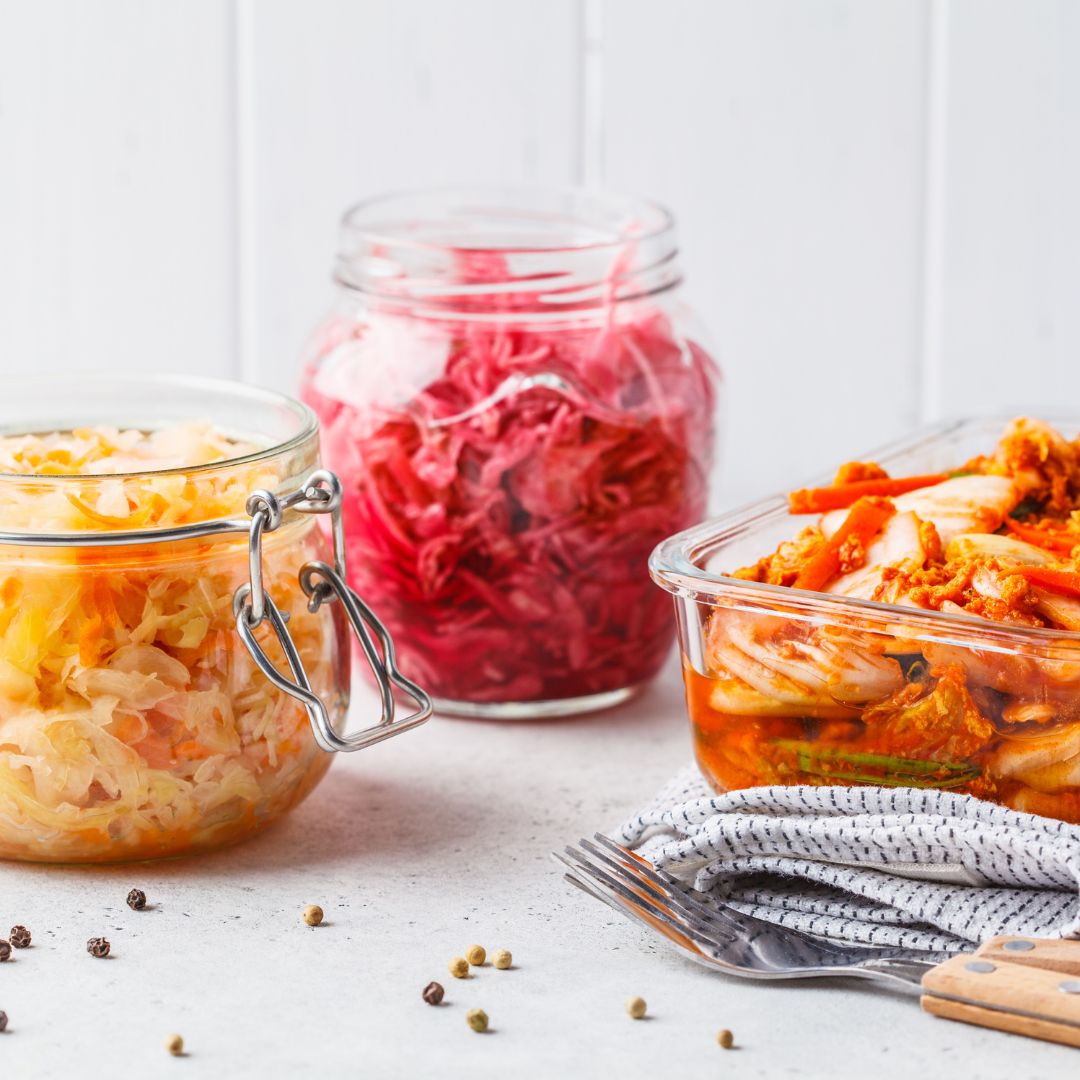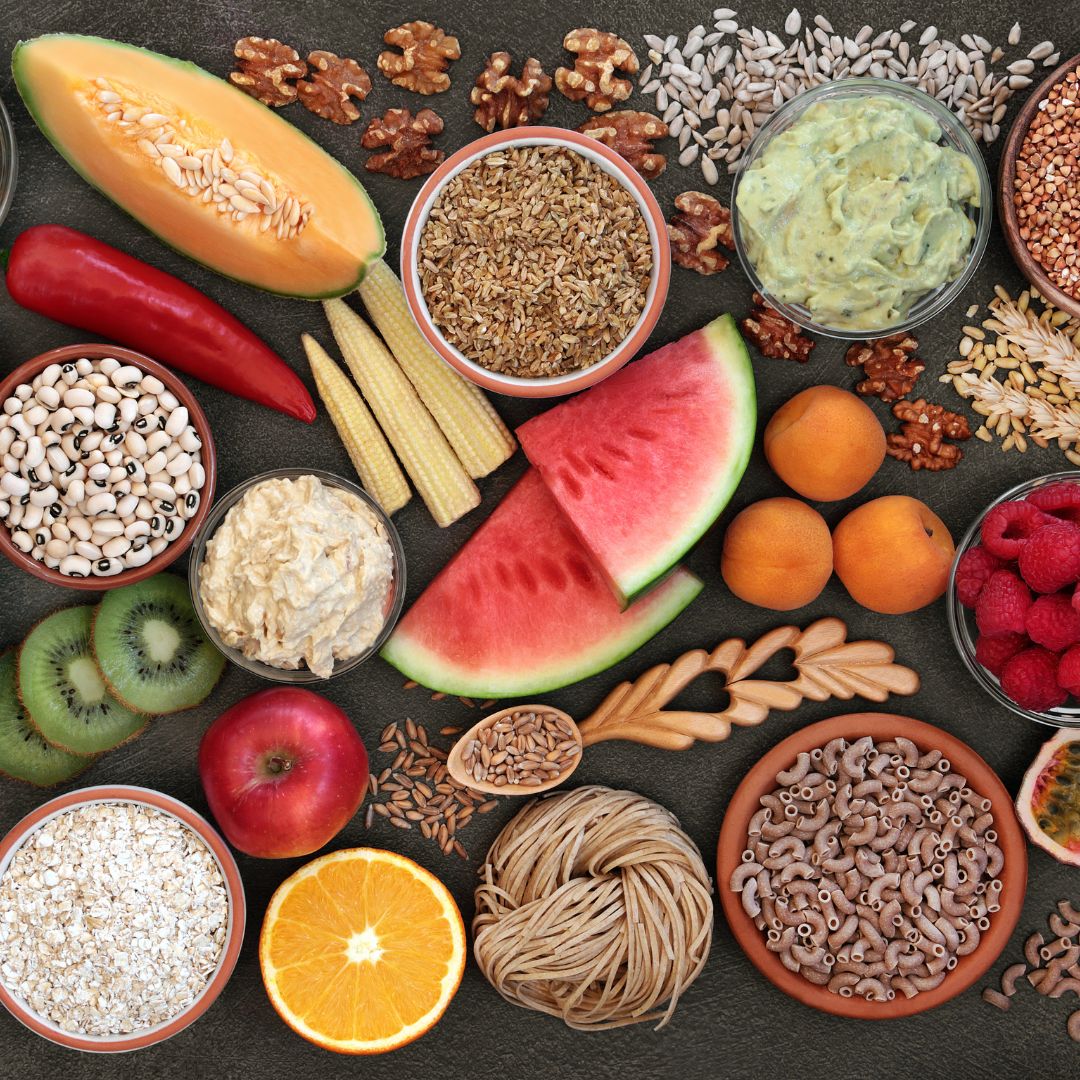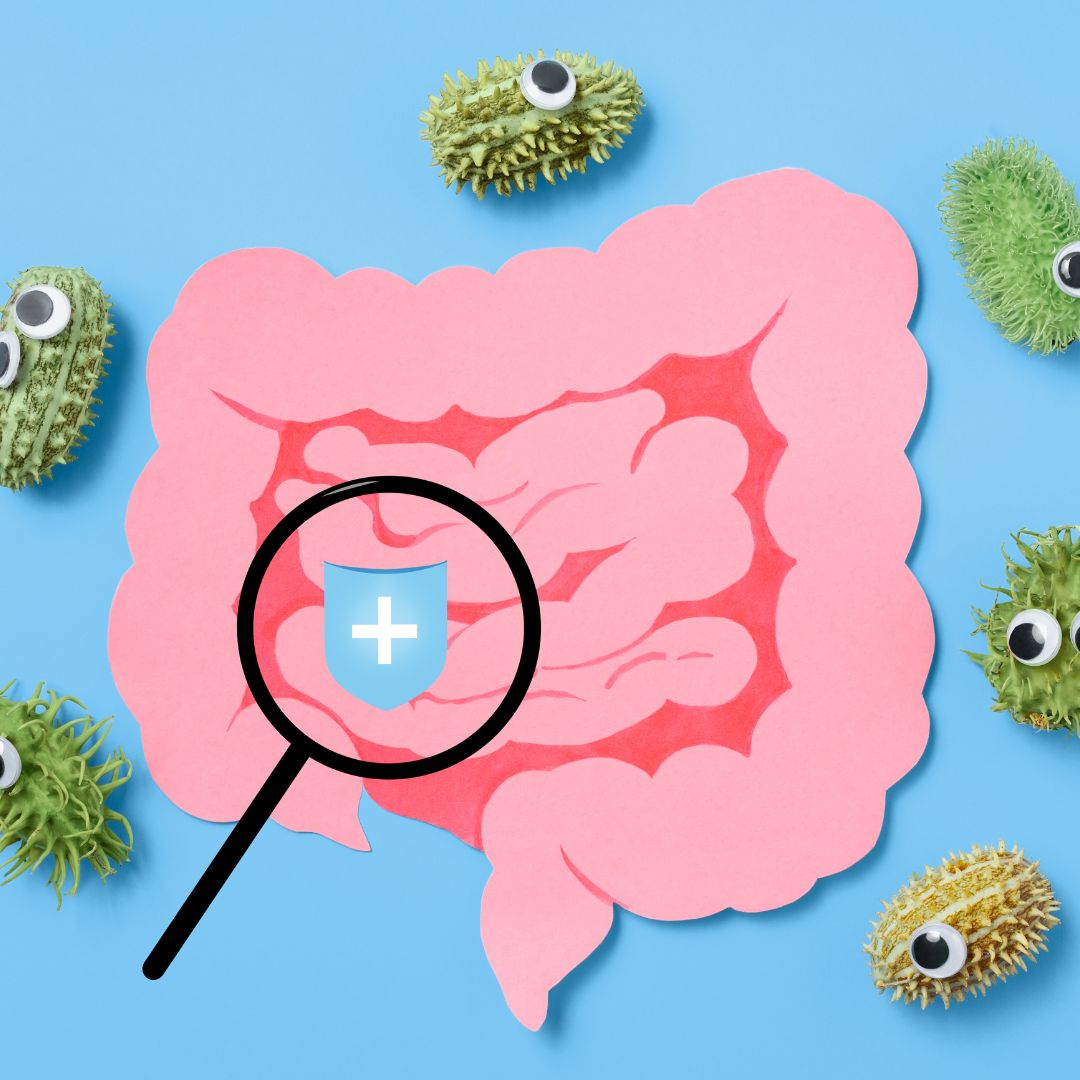
Winter Wellness Starts in the Gut
When winter arrives, many of my clients tell me that they feel more tired, sluggish, and run down. Frequent colds, a flare-up in digestive symptoms, or lingering fatigue can all be signs that your immune system is under extra strain.
What’s less well known is that much of your immune strength actually begins in your gut. Your gut microbiome - that vast community of bacteria, fungi, and other microbes living in your colon - plays a major role in keeping your immune system balanced and responsive.
In this blog, we’ll explore how your gut influences immunity, why microbial diversity matters most during the colder months, and which foods can help to support both your gut and immune resilience this winter.
How Gut Health Shapes Immunity
It’s estimated that around 70% of the body’s immune cells are located in and around the gut wall. This isn’t just coincidence, it’s where your immune system and the outside world meet. Every day, your gut encounters potential pathogens, allergens, and toxins, all of which must be distinguished from harmless food particles or beneficial microbes.
This delicate balance is controlled by a network called the gut-associated lymphoid tissue (GALT). The GALT is responsible for training immune cells to respond appropriately, strong enough to eliminate genuine threats but tolerant enough to avoid excessive inflammation.
When the gut barrier is strong and populated by diverse, beneficial microbes, it sends healthy signals to the immune system, promoting tolerance and repair. When that balance is disrupted, a state known as dysbiosis, communication becomes distorted. The immune system can become either overactive (triggering inflammation, allergies, or autoimmunity) or underactive (leaving you more susceptible to infections).
Research increasingly shows that changes in the gut microbiome can directly influence the effectiveness of immune responses, including how well the body responds to viral infections and vaccines. Seasonal shifts in diet, lifestyle, and stress may all affect this balance, making winter a particularly important time to focus on gut health.
Does any of this sound familiar to you?
Microbiome Diversity and Immune Defence
A healthy gut is a diverse one. Each species of gut microbe plays a unique role in maintaining balance, producing beneficial metabolites, and interacting with the immune system. Reduced microbial diversity, often seen in people with stress, poor diet, antibiotic use, or chronic illness, is associated with lower immune resilience.
One of the most important functions of a diverse microbiome is the production of short-chain fatty acids (SCFAs) such as butyrate, acetate, and propionate. These compounds are made when gut bacteria ferment dietary fibre.
SCFAs help to:
In winter, several factors can reduce SCFA production. People tend to eat fewer plant-based foods and less soluble fibre, which are key fuels for beneficial bacteria.
Cold weather and lower activity can also slow gut motility, altering microbial composition. As SCFA levels fall, the gut barrier becomes more permeable, and low-grade inflammation can increase, leaving the immune system less efficient and more easily fatigued.
A number of recent studies show that individuals with greater microbial diversity and higher SCFA production have lower rates of respiratory infections and recover more quickly when they do get sick. Maintaining a balanced microbiome can therefore provide indirect protection for the lungs, sinuses, and other mucosal surfaces that rely on immune communication with the gut.
Prebiotics and Probiotics Explained
This is an area that many of my clients find confusing – what are we supposed to do? Simply put, supporting gut health in winter often comes down to nourishing beneficial microbes (with prebiotics) and topping up helpful strains (through probiotics).
Prebiotics are types of fibre or resistant starch that your body cannot digest but your gut microbes can. They are fermented in the colon to produce SCFAs, which feed intestinal cells and modulate inflammation. Examples include inulin, fructooligosaccharides (FOS), and galactooligosaccharides (GOS), found naturally in foods such as leeks, onions, garlic, bananas, oats, and Jerusalem artichokes.
Probiotics, on the other hand, are live microorganisms that can help restore microbial balance when consumed regularly in adequate amounts. They act by:
Clinical trials and systematic reviews have found that certain probiotic strains can reduce the risk and duration of upper respiratory tract infections. The benefits are strain-specific and usually appear after consistent use over several weeks.
Often the best choice is to go for food rather than a supplement. Probiotic food sources like live yoghurt, kefir, sauerkraut, kimchi, and fermented vegetables are an excellent place to start, especially when introduced gradually for those with sensitive digestion.
If you find that your gut reacts badly to prebiotic fibres or probiotic foods, it’s worth getting in touch, as this could be a telltale sign of some imbalance in your microbiome – something we can investigate.
Best Foods for a Winter-Proof Gut
In winter, digestion naturally slows, and our food choices often become heavier, starchier, and lower in fibre. The result can be reduced microbial diversity and a weakened gut barrier.
Fortunately, small, consistent changes can have a big impact on gut and immune resilience.
Eat more fibre-rich plants
Aim for a variety of vegetables, fruits, wholegrains, nuts, and seeds each week. Diversity is key: each type of fibre feeds different groups of beneficial bacteria. Soluble fibre, found in oats, carrots, apples, courgettes, and flaxseed, is especially valuable for SCFA production.
Include fermented foods regularly
Incorporate small servings of live yoghurt, kefir, sauerkraut, kimchi, miso, or tempeh. These foods supply live microorganisms and help reinforce the gut barrier. If you’re sensitive to FODMAPs or histamine, start with very small portions and monitor tolerance.
Feed your microbes with prebiotics
Use foods like leeks, garlic, onions, green bananas, and chicory root to feed beneficial bacteria. These can be combined with probiotic foods for a synergistic effect, often called synbiotic eating.
Add polyphenol-rich foods
Brightly coloured plant foods such as berries, red cabbage, beetroot, herbs, and green tea provide polyphenols that act as antioxidants and microbial regulators. These compounds can encourage the growth of beneficial species like Akkermansia muciniphila and Bifidobacteria.
Stay hydrated and support motility
Hydration is often overlooked in winter when thirst cues are weaker. Adequate water intake supports regular bowel movements, ensuring waste and microbial metabolites move efficiently through the colon. Gentle daily movement, warmth, and fibre all help stimulate healthy peristalsis.
Mind the stress–gut link
Winter often brings more psychological stress, which can suppress the vagus nerve and slow digestion. Mindful eating, deep breathing, and restorative sleep all support the parasympathetic “rest and digest” state that keeps your gut working optimally.
If your gut feels out of balance this winter - with bloating, irregular digestion, or increased fatigue - it may be a sign your microbiome needs more support. By nurturing your gut, you’re also building a stronger foundation for your immune health, mood, and energy.
Or, if you’re interested in finding out more via microbiome testing, why not book a free call?

Travel without the tummy drama:
Your guide to a happy gut on holiday
We all know the feeling. You’re on holiday. The sun’s out, the sangria’s flowing, and everything should be feeling great - except your tummy has decided to stage a protest. You’re bloated and uncomfortable and you’re only a few days in. What if the rest of your well-earned rest is just like this? And didn’t the same happen last year?
If your digestion tends to fall apart the minute you step outside your usual routine, you’re not alone. Travel might be great for the soul but it’s not always great for the gut. Flying, new foods, disrupted sleep, eating at odd times (or just eating everything), can be a perfect storm for bloating, constipation, wind, or that “I’ve swallowed a beach ball” feeling. Now’s the time for a new holiday regime so you can enjoy your time away – and it starts in the weeks before you travel.
Why travel upsets your digestion
Let’s start with the obvious: travel puts pressure on your digestive system in all sorts of ways.
Air travel is dehydrating, which dries out your gut (even your colon gets thirsty). You’re probably sitting more and moving less, which slows down motility. There’s also jet lag, sleep disruption, foreign bugs, a totally different diet as well as the fact that your usual ‘go-to’ breakfast has been replaced with a hotel buffet and a lot of croissants.
Even just not having a routine can be enough to throw your gut off. Our digestive systems are creatures of habit; they thrive on rhythm. Suddenly eating three hours later than usual or skipping meals altogether (hi, travel day chaos) can leave your gut going, “What. Is. Happening.”
How to give your gut a fighting chance
Your holiday digestive health action plan doesn’t need to be a military operation, just a few small habits that can slide easily into your suitcase.
First, hydration. Start drinking more water the day before you travel, not just once you’re already airborne and begging the flight attendant for another thimble-sized cup. If you’re flying, take an empty water bottle and fill it up after security.
A magnesium supplement can be a game-changer especially if you’re prone to constipation or feel tense when travelling. It’s an important mineral that is involved in hundreds of different reactions in the body and plays a key role in anything involving muscle – and everything to do with the digestive system is muscular one way or another. Pop a supplement into your evening routine or bring a sachet of magnesium citrate. Do this ahead of travel so you have time to see how your body responds.
What about probiotics? These are definitely worth considering. Whether it’s capsules or travel-friendly sachets, they can help buffer the shock of unfamiliar food and keep your gut bacteria a little more balanced. Ideally, start your probiotics two weeks ahead of time and introduce them before you travel. Look out for formulations that also include the beneficial yeast Saccharomyces boulardii. Probiotics may help prevent / reduce likelihood of some of the common problems associated with holiday travel, including bloating, constipation, food poisoning and diarrhoea.
Anchor your habits
No one wants to be batch-cooking quinoa in your Airbnb or counting macros at the poolside buffet, and nor should you. But you can keep a few gentle habits going that support your gut - and your overall health.
Maybe it’s starting your day with a short walk. Just ten minutes outside can get things moving (in every sense). Maybe it’s packing a few familiar snacks - like oatcakes, trail mix, or a protein bar so you don’t go from “mildly peckish” to eating half a baguette as a snack.
Try to keep at least one or two meals a day consistent with what you’d normally eat. That could be a veggie-packed lunch or your usual breakfast (bonus points if there’s some fibre involved). Your gut loves routine and giving it some familiar fuel can make a big difference.
Don’t underestimate the power of slowing down. Chew your food properly. Breathe while you eat. Enjoy it. Not only will this help your digestion, but it means you’ll actually taste the food instead of inhaling it between excursions.
And when things still go wrong
Despite your best efforts, travel tummy sometimes happens. If you’re a bit bloated or backed up, don’t panic. Up your water, move more, eat lighter (but still nourishing) meals, and prioritise sleep. And if your gut’s not playing ball after you get back? That’s the perfect time to reset. You know where I am if you need me.
If you’re heading away soon and want a gut-friendly travel plan tailored to your body, let’s chat. I can help you feel confident, not constipated. Just click here to book a free call.

Spotlight on IBS
Irritable Bowel Syndrome is a problem I see so often in clinic, and it is problematic on many different levels. If you have been diagnosed with this condition, you may well have been suffering with it for years and, while a diagnosis can – at first– offer comfort in finally having a recognised problem, the satisfaction is short lived because often that’s where all support ends, and you’re left no further forward in actually fixing what the problem is.
The difficulty begins because IBS is essentially meaningless; it’s a catch-all term used to encompass a huge variety of digestive issues. If you’re serious about getting to the bottom of the problem (no pun intended), I’m happy to discuss your symptoms and help find a way forward. You can book a free IBS health check with me by clicking here.
In my experience, it’s likely to be one of the following five conditions.
1 SIBO (small intestine bacterial overgrowth)
Around 60% of people with IBS will have SIBO. Though you might have heard about good (and bad) bacteria in the gut, really what experts are talking about is the balance of bacteria in the large intestine: the colon.
The small intestine shouldn’t have any bacteria, and each day the body should perform a flush to sweep bacteria from the small intestine and into the large intestine. This flush is called the ‘migrating motor complex’. For a huge variety of reasons (historic food poisoning being the most common, but also low levels of stomach acid or adhesions play a role, among others) the bacteria are not swept away.
The trouble is that these bacteria can ferment the food in your small intestine, causing gas, belching, bloating, pain and a variety of other symptoms, including constipation and/or loose stools, and even anxiety. A breath test can establish which gases are present, and we can devise an action plan based on your results.
2 Lactose intolerance
This is when your body is not able to tolerate lactose, a type of sugar found naturally in milk and other dairy products. Essentially, bacteria in your intestine feed on these milk sugars, leading to a host of IBS symptoms, like bloating and gas, nausea, constipation or diarrhoea.
It can go hand in hand with other digestive complaints, such as coeliac disease or increased intestinal permeability (‘leaky gut’). Lactose intolerance can be diagnosed via a simple at-home breath test.
3 Fructose malabsorption
The symptoms are very similar to lactose intolerance. Fructose (which is found in fruit, honey and many processed foods) is a sugar, which, like lactose, is digested in the small intestine.
Some people cannot absorb fructose, and what is not absorbed is fermented by intestinal bacteria, causing bloating, cramping, gas and distension of the stomach. You might also experience brain fog and headaches. A breath test will diagnose the condition.
4 Dysbiosis
This is an imbalance in the levels of beneficial (good) and pathogenic (bad) bacteria in the large intestine or colon.
This is now common due to overuse of antibiotics and alcohol, an increase in high sugar diets, and stress.
Symptoms can vary from a sluggish bowel or diarrhoea, pain, bloating and flatulence, to chronic bad breath, joint pain, fatigue and food sensitivities.
Dysbiosis is also implicated in a variety of health conditions like diabetes, heart disease and obesity. A stool test can help establish whether your gut bacteria are out of balance, along with a host of other markers that might be useful in getting to the root of your digestive problems.
5 Yeast overgrowth
Where the gut environment becomes out of balance (due to dysbiosis), yeast can thrive. Diets high in sugar feed the yeast – although if you think you might have a yeast overgrowth, it’s worth noting that long-term yeast problems can mean that the yeast cells are pathogenic or disease causing, and that the yeast has switched its metabolism to also be able to digest protein and fat.
Symptoms of yeast overgrowth include recurring thrush, gas or bloating, fatigue, bad breath, cravings for sweet foods, joint pain and brain fog.
A stool test can establish the presence of candida or other yeast overgrowth.
Some people struggle with digestive problems for years. If you are ready to make fixing your gut health a priority, I would love to work with you. Please click the link here to book your free IBS health check now.

How to improve the health of your microbiome
While there are a number of factors that can contribute to your microbiome, such as your environment, infections or illnesses, food poisoning exercise, diet is one of the most powerful factors. Here are some foods which are really good for supporting your microbiome:
FIBRE
Fibre is one of the best things to eat to support healthy digestion. Fibre is described as either insoluble or soluble.
Insoluble fibre is part of the plant wall in fruit and veg. It’s indigestible so it passes right through your system, sweeping up toxins and other waste products as it goes, and keeping you regular. The undigested fibre is also fermented by gut bacteria, producing the beneficial short chain fatty acids I mentioned earlier.
You can find insoluble fibre in:
· Fruit and veg
· Beans and lentils
· Oats
· Wholegrain foods like brown rice and wheat
Soluble fibre can be partially digested and is well-celebrated for its ability to reduce cholesterol in the blood and normalise blood sugar levels.
You can find soluble fibre in:
· Oats
· Veg
· Fruit (especially apples, pears, berries and citrus fruits)
· Beans and lentils
FERMENTED FOODS
Fermented foods have a long tradition in some parts of the world, especially Asia, Africa and Eastern Europe. Bacteria (and sometimes beneficial yeasts) might be involved in the process and the result is an increase of good bacteria in the foods.
You’ve probably heard of live or ‘bio’ yoghurt. Some of these other probiotic foods might sound peculiar and a little ‘advanced’ for most regular people. However, they are now commonly found on supermarket shelves (you’ll find them in the world foods aisle where the Oriental products are) and, while they might not be the kind of product you would usually go for, it is always worth experimenting.
Kimchi, in particular, is often combined with chilli and other flavours and is far tastier than its name might suggest.
• Yoghurt
• Pickles (gherkins)
• Sauerkraut
• Kimchi (fermented cabbage)
• Tempeh (fermented soya beans)
• Natto (fermented soya beans)
• Miso soup (fermented soya beans)
• Tamari soy sauce.
• Buttermilk
• Some cheeses like cottage cheese, gouda, mozzarella & cheddar.
Fermented drinks
Like other fermented products, these were once only found in health food shops and were perhaps the prevail of people who ate a very clean and unprocessed diet. These were a secret waiting for the masses to discover. Often flavoured with fruits, they really are delicious and do not taste ‘worthy’. You’ll find them in the chilled drinks section in most supermarkets.
• Kombucha (fermented tea – sweet and fizzy but without sugar)
• Kefir (fermented dairy drink very much like a yoghurt drink).
The only way you’ll know if it’s for you is to try!
CRUCIFEROUS VEGETABLES
These smelly veg bring amazing health benefits on a number of different levels. Since we’re talking about foods that are helpful for your digestion, you should know that they contain compounds called glucosinolates, which are fermented by bacteria and used as fuel. They are prebiotic.
Examples are:
Bok choy
Broccoli
Brussels sprouts
Cabbage
Cauliflower
Kale
Rocket
Spring greens
Watercress
ANTI-MICROBIAL FOODS
Some foods exert a natural antibiotic or anti-fungal effect and can be useful for keeping nasties like pathogenic bacteria or unwelcome yeasts at bay.
These include caprylic acid found in coconut. Coconut oil is also a very good oil to use in cooking, especially at high temperatures.
Garlic contains the ingredient allicin, which has historically proven itself to be an effective killer of both bacteria and viruses, making it a great immune-boosting ingredient. Use it raw wherever possible.
Olive oil – the oleic acid has anti-bacterial properties. Use it generously to dress salads and veg.
WHAT TO AVOID
In the same way there are things your digestive system loves, there are things it will not love you for.
Sugar. That’s the number one thing to avoid, plus anything that contains added sugar.
Other things your tummy is not fond of include highly refined products like white rice, pasta, pastry and snacks like crisps and biscuits.
And if you'd like to know further, why not book a free call? You can book in here.

The “Microbiome” - Master Controller of your Health
Do you ever stop to think about the bustling community inside you, one that plays a vital role in your health and wellbeing? I'm not talking about a trendy neighbourhood or a bustling city. I'm referring to your microbiome – the busy metropolis of microorganisms that call your body home sweet home. Unless you have digestive problems, you probably don’t normally give this a second’s thought - but you should.
The “microbiome” is the guardian of your health, and your gut environment could be the reason you have anxiety or low mood, painful periods, terrible menopause symptoms, or difficulty losing weight.
What is the microbiome?
Think of it as your very own ecosystem, but on a microscopic scale. It's made up of trillions of bacteria, viruses, fungi, and other microscopic critters that live in various parts of your body, from your gut to your skin and everything in between.
You might be thinking, "bacteria? That doesn't sound healthy’. Although we used to hearing about bacteria as the bad guys, not all bacteria are bad. In fact, many of them are crucial for keeping you in good health. They help with digestion (of course), support your immune system, and even play a role in regulating your mood, hunger levels, sleep, stress and hormones.
That’s because what happens in the gut doesn’t stay in the gut.
The microbiome and mental health
There is a constant two-way communication with your brain and your digestive system. In my world, we call it the gut-brain axis. It’s been the subject of a lot of research in the last decade and there is increasing evidence that your gut bacteria heavily influence your mood.
Your gut bacteria make chemicals that affect your brain. They produce neurotransmitters, chemical messengers that help transmit signals in the brain. One of these neurotransmitters is serotonin, often referred to as the "happy hormone" because it plays a crucial role in regulating mood and emotions.
A whopping 90% of your body's serotonin is produced in your gut. The balance of bacteria in your gut can directly impact your serotonin levels, and subsequently, your mood. When you have a healthy and diverse microbiome, it's like having a team of cheerful little helpers churning out serotonin to keep your spirits high.
But here's where it gets interesting: your brain can speed up your gut (very simply, how quickly food moves through your body) and change what microbes are present.
And when your gut bacteria are out of whack, it can throw this delicate balance off-kilter. Imbalances in the microbiome have been linked to conditions like depression and anxiety.
The microbiome and immunity
If you’re the kind of person who catches every bug going, consider this might be down to what’s happening in your gut. The microbiome and your immune system are heavily linked.
Imagine your immune system as your body's very own security team, constantly on the lookout for intruders and ready to spring into action at a moment's notice. The microbiome plays a crucial role in training and coordinating this defence force.
The bacteria are like the teachers in an elite military academy, helping to educate and train your immune cells to distinguish between friend and foe. Your gut bacteria also produce molecules called metabolites, which act as messengers in the intricate dance between your microbiome and your immune system. These metabolites help regulate the activity of your immune cells, ensuring they respond appropriately to threats without going overboard and causing inflammation.
Inflammation is a bit like setting off a fire alarm – it's a necessary response to danger, but too much of it can cause chaos and damage. Luckily, your gut bacteria are there to keep things in check, helping to maintain a delicate balance between fighting off invaders and keeping the peace within your body.
But the relationship between your microbiome and your immune system is a two-way street. Your immune system also plays a crucial role in shaping the composition of your microbiome, keeping the peace by promoting the growth of beneficial bacteria and keeping harmful bacteria in check.
The microbiome and your hormones
Your gut bacteria aren't just masters of digestion and immunity; they also have a hand in regulating your hormones. One of the key players is cortisol, often referred to as the "stress hormone".
When you're feeling stressed out, your body releases cortisol to help you cope with the situation. Your gut bacteria can influence the production and regulation of cortisol, potentially shaping how your body responds to stress.
Certain types of gut bacteria can affect the HPA (hypothalamic-pituitary-adrenal) axis, a complex network of hormones involved in the stress response. By producing metabolites that interact with this system, your gut bacteria can influence the production and regulation of cortisol, potentially impacting how your body responds to stressors.
But that's not all – your gut bacteria can also influence other hormones, like insulin, which plays a crucial role in regulating blood sugar levels. Studies have shown that imbalances in the microbiome can lead to insulin resistance, a condition where your cells become less responsive to insulin, potentially leading to high blood sugar levels and type 2 diabetes.
The microbiome and female hormone health
One of the hormones especially affected by gut health is oestrogen, one of the main female hormones. In fact, there is a collection of specialised bacteria in the microbiome called the “oestrobolome”. The oestrobolome contains, among other things, the bacteria responsible for breaking down and eliminating hormones, principally oestrogen.
In short, the microbiome plays a key role in oestrogen metabolism, so an imbalance in healthy bacteria can result in too much or too little circulating oestrogen, which can lead to an imbalance between oestrogen and other hormones. This can have a knock-on effect on your weight, sex drive and your mood.
For healthy oestrogen levels, you want optimal levels of an enzyme called beta-glucuronidase. If levels of this enzyme are too high, oestrogen that might have been marked for excretion gets reactivated, potentially leading to too much oestrogen in relation to other hormones (unopposed oestrogen or oestrogen dominance). This can create a range of problems ranging from PMS, infertility, obesity and metabolic syndrome, and oestrogen-related cancers.
The microbiome and your skin
Your skin is your body's largest organ and serves as a vital barrier between you and the outside world. And just like your gut, your skin is home to a bustling community of bacteria, fungi, and other microorganisms that make up your skin microbiome.
Again, bacteria on your skin might sound like a recipe for disaster but the vast majority of these microbes are harmless or even beneficial, playing essential roles in maintaining healthy skin.
One of the skin microbiome's primary functions is to act as a barrier against harmful pathogens, preventing them from invading your body and causing infections. When your skin microbiome is in balance, it helps keep your skin healthy and resilient, warding off pesky invaders like bacteria, viruses, and fungi.
Your skin microbiome isn't just a passive bystander; it actively interacts with your immune system, helping to educate and train immune cells to distinguish between friend and foe. Studies have shown that imbalances in the skin microbiome can lead to inflammatory skin conditions like acne, eczema, and psoriasis, suggesting that maintaining a diverse and balanced microbiome is crucial for healthy skin.
When the microbiome misbehaves
Any disruption to the microbiome may result in an imbalance in the microbiota leading to ‘dysbiosis’. Dysbiosis means:
When your gut health gets imbalanced and dysbiosis happens, you’re more likely to have stomach and other health issues. These conditions can include:
Typical symptoms of dysbiosis include:
Testing can be invaluable in finding out what is happening with your microbiome. A comprehensive stool test can map out your microbiome, detailing friendly bacteria, and potentially pathogenic bacteria, funguses or parasites. If you’d like to know more, why not get in touch? Just book a link here.

How to beat the festive bloat
We’re all prone to a little indulgence at Christmas, but rich food and overeating can play havoc with your digestion, leaving you bloated and uncomfortable. It’s not surprising - we consume on average 6,000 calories on Christmas Day alone! That’s nearly three times the recommended daily intake for women!
There are a variety of reasons why the holidays create more tummy troubles than the rest of the year:
USE YOUR SENSES
The first step in the digestive process is often overlooked, but it’s a critical one. Known as the cephalic phase, it’s triggered when you see or smell food. You are literally whetting your appetite.
When you start thinking about the lovely meal you are going to prepare, you are getting your digestive juices flowing. The enzymes in your saliva help you break down your food more easily. So, when the time comes, your body is ready to start digesting food before you have even cut the first slice – never mind actually put anything in your mouth.
It may sound like an incredibly simple step – and it is – but these days we are often so busy that we don’t make the time to think about our food in this way. If you find you’re always eating on the go, throwing a sandwich down your neck at your desk or having a TV dinner, this is a vital step you are missing out on. One trick is to be mindful and try and spend a few minutes thinking about your tasty lunch before you eat it to get the digestive juices going.
CHEW YOUR FOOD
Remember what Mum used to say? Chewing your food (the second phase of digestion) is key when it comes to good gut health. With proper chewing, you are mechanically breaking down the food into smaller pieces so that there’s a greater surface area and the digestive enzymes can get to work more easily, doing their job.
If you’re not chewing properly, it’s highly likely that you’re not digesting your food very well. And that means you won’t be absorbing the vital nutrients either. Not chewing also means that the food you eat takes much longer to break down, and, as it hangs around in your digestive system, it can start to ferment, causing uncomfortable wind, gas and bloating.
Don’t worry about chewing a certain number of times – that all depends on what you are eating and various other factors.
Instead, try this test: chew your food enough so that if someone asked you to spit it out, they wouldn’t be able to identify what it was. Another sign you need to chew more is if you start to see undigested food in your stools.
BALANCE YOUR STOMACH ACID
Sales for heartburn tablets are skyrocketing, because so many people wrongly assume that their digestive troubles are due to too much stomach acid. What nutritionists like me find more frequently in clinic is the total opposite! Getting older, stress and some over-the-counter medications can make your stomach acid levels drop to the extent that you don’t produce enough to digest food sufficiently.
Why is this important? The stomach acid you produce not only kills any bacteria in the food you are eating, it also breaks down the protein in your meal. If you’re not fully digesting the protein element in food, it can start to putrefy, creating gases that force open the oesophageal sphincter muscle (a type of ring muscle) and what little stomach acid there is can escape. So, the burning feeling, especially if accompanied by smelly gas, can be a sign your digestion isn’t working as well as it should be.
One solution is to have a teaspoon of apple cider vinegar before each main meal. It’s important you choose apple cider vinegar with the ‘mother’, rather than one you can buy in the supermarket (that’s for your chips).
Some people genuinely produce too much stomach acid and, if you try the apple cider vinegar trick and it seems to make things worse, you can neutralise the acid by taking a little bicarbonate of soda, stirred into water.
PLAN WHEN YOU WON’T EAT
As well as WHAT to eat, one of the things I find myself talking a lot about in clinic is NOT eating. It’s never truer than at this time of year.
It’s important to space out your meals, so the digestive system actually gets a chance to rest. This might require some self-discipline if your house is routinely full of bowls of nuts or towers of chocolate boxes.
Eating no more than every 4 hours is a good benchmark to aim for, and it gives the body enough time to completely digest the previous meal and have a break before you put it to work again. Of course, there will be days when your eating routine falls out of whack, but don’t beat yourself up. Just get back on track the following day.
And if any of your symptoms are really bugging you, or lasting longer than expected, why not get in touch?
![]()
Please get in touch and find out more - I offer a free 30-minute exploratory call.